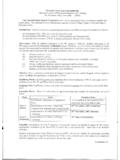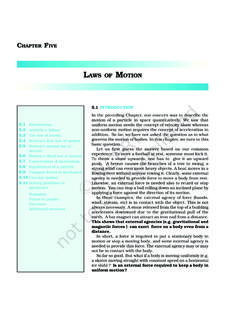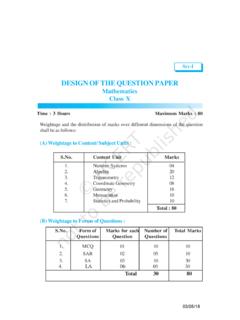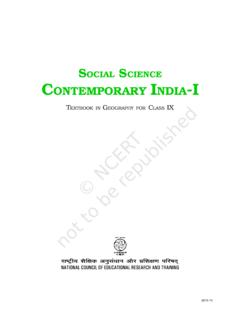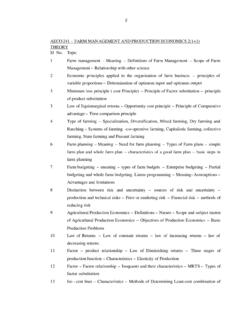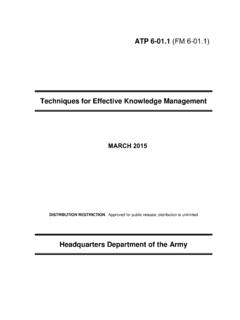Transcription of PRINCIPLES OF MANAGEMENT CHAPTER
1 2 PRINCIPLES OF MANAGEMENTCHAPTERLEARNING OBJECTIVEST oyota follows certain well-defined business PRINCIPLES guiding its functioning. These are:1. Honour the language and spirit of law of every nation and undertake open and fair corporate activities to be a good corporate citizen around the Respect the culture and customs of every nation and contribute to economic and social development through corporate activities in local To provide clean and safe products and to enhance the quality of life Create and develop advanced technologies and provide outstanding products and services that fulfil the needs of customers Foster a corporate culture that enhances individual creativity and teamwork value.
2 While honouring mutual trust and respect between MANAGEMENT and Pursue growth and harmony with global community through innovative Work with business partners in research and creativity to achieve stable, long-term growth and mutual benefits and be open to new partnerships. These PRINCIPLES , will guide the company in its global vision 2010. This global vision envisages continuous innovations in future, use of environment friendly technologies, respecting and working with different sections of society and establishing an interactive relationship with studying this CHAPTER , you should be able to:n State the meaning, nature and significance of PRINCIPLES of MANAGEMENT ;n Explain Taylor s PRINCIPLES and techniques of Scientific MANAGEMENT .
3 Andn Explain Fayol s PRINCIPLES of of toyota/ 75years/data/conditions/philosophy/guidi ng is clear from the foregoing case that managerial pursuits at Toyota Motor Corporation are driven by PRINCIPLES that serve as broad guidelines for stating the vision as well as the ways to achieve it. Similarly, many other business enterprises have followed various PRINCIPLES in their working Guiding PRINCIPLES of Toyota Motor 3024-09-2019 12:05:00 PM2021 22 PRINCIPLES of Management31over a period of time. A number of MANAGEMENT thinkers, and writers have also studied PRINCIPLES of MANAGEMENT from time-to-time.
4 In fact, there is a long history of MANAGEMENT thought. MANAGEMENT PRINCIPLES have evolved and are in the continuous process of evolution. (see box.)You can see that the evolution of MANAGEMENT thought has been very fascinating. In this CHAPTER we will study the contributions of Fredrick Winslow Taylor and Henri Fayol who as you have read are associated with the classical MANAGEMENT theory. Both of them contributed immensely towards the study of MANAGEMENT as a discipline. Whereas Taylor was an American mechanical engineer, Henri Fayol was a French mining engineer. Taylor gave the concept In tracing the history of MANAGEMENT , one comes across various schools of thought that have outlined PRINCIPLES to guide MANAGEMENT practices.
5 These schools of thought may be divided into 6 distinctive phases: 1. Early Perspectives; 2. Classical MANAGEMENT Theory; 3. Neo Classical Theory Human Relations Approach; 4. Behavioural Science Approach Organisational Humanism; 5. MANAGEMENT Science/Operational Research; 6. Modern PERSPECTIVES The first known MANAGEMENT ideas were recorded in 3000-4000 One Pyramid built by Egyptian ruler Cheops required work to be done by 100,000 men for over twenty years in 2900 It covered 13 acres of land and measured 481 meters in height. The stone slabs had to be moved thousands of kilometres of distance. As folklore goes, even the sound of a hammer was not heard in the villages in the vicinity of the site of these pyramids.
6 Such monumental work could not be completed without adherence to PRINCIPLES of sound MANAGEMENT THEORY Rational economic view, scientific MANAGEMENT , administrative PRINCIPLES , and bureaucratic organisation characterise this phase. While the rational economic view assumed that people are motivated by economic gains primarily; scientific MANAGEMENT of Taylor and others emphasised one best way of production etc; administrative theorists personified by Henri Fayol etc looked at the best way to combine jobs and people into an efficient organisation; bureaucratic organisation theorists led by Max Weber looked at ways to eliminate managerial inconsistencies due to abuse of power which contributed to ineffectiveness.
7 This was the era of the industrial revolution and factory system of production. Large scale production would not have been possible without adherence to the PRINCIPLES governing organising production based on division of labour and specialisation, relationship between man and the machine, managing people and so of MANAGEMENT 3124-09-2019 12:05:00 PM2021 2232 Business Studiesof Scientific MANAGEMENT whereas Fayol emphasised Administrative PRINCIPLES .But before we go into the details of their contributions let us study the meaning of the PRINCIPLES of of MANAGEMENT : the concePtA managerial principle is a broad and general guideline for decision-making and behaviour.
8 For example while deciding about promotion of an employee one manager may consider seniority, whereas the other may follow the principle of may distinguish PRINCIPLES of MANAGEMENT from those of pure science. MANAGEMENT PRINCIPLES are not as rigid as PRINCIPLES of pure science. They deal with human behaviour and, thus, are to be applied creatively given the demands of the situation. Human behaviour is never static and so also technology, which affects business. Hence all the PRINCIPLES have to keep pace with these changes. For example, in the absence of Information and NEO CLASSICAL THEORY HUMAN RELATIONS APPROACH This school of thought developed between 1920s to 1950s felt that employees simply do not respond rationally to rules, chains of authority and economic incentives alone but are also guided by social needs, drives and attitudes.
9 Hawthorne Studies at GEC etc., were conducted then. It was quite natural that in the early phases of the industrial revolution, the emphasis was on development of techniques and technology. The attention to the human factor was the salient aspect of this school of thought. This attention was to serve as a precursor to the development of behavioural sciences. BEHAVIOURAL SCIENCE APPROACH ORGANISATIONAL HUMANISM Organisational behaviourists like Chris Argyris; Douglas McGregor, Abraham Maslow and Fredrick Herzberg used the knowledge of psychology, sociology and anthropology to develop this approach. The underlying philosophy of organisational humanism is that individuals need to use all of their capacities and creative skills at work as well as at home.
10 MANAGEMENT SCIENCE/OPERATIONAL RESEARCH It emphasises research on operations and use of quantitative techniques to aid managers to take MANAGEMENT It sees modern organisations as complex systems and underlies contingency approach and use of modern techniques to solve organisational and human : Adapted from Internet modern history source book on 3224-09-2019 12:05:00 PM2021 22 PRINCIPLES of Management33 Communications Technology (ICT), a manager could oversee only a small work force that too within a narrow geographical space. The advent of ICT has expanded the capability of the managers to preside over large business empires spread across the globe.
